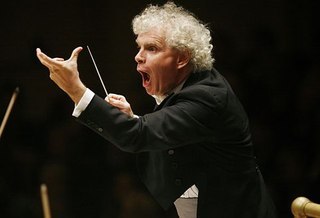|
Back
Intimations of Immortality New York
Isaac Stern Auditorium, Carnegie Hall
10/02/2014 - & August 30 (Berlin), 31 (Salzburg), September 2 (Luzern), 5 (London), 2014
Sergei Rachmaninoff: Symphonic Dances, Opus 45
Igor Stravinsky: The Firebird (Complete)
Berlin Philharmonic, Sir Simon Rattle (Music Director and Conductor)

Sir S. Rattle (© www.waytofamous)
Like Ebola, Carnegie Hall this month is being infected, though the infection is an impressive orchestral virus, with the London Philharmonic, the Belgrade Philharmonic, and no less than four different concerts by the Berlin Philharmonic. The Berliners are not an orchestra which does their music, then moves on to Duluth, Scranton and Schenectady. They are staying around, with mainly music from Germany and Russia, and an ensemble which hits–usually–all the right notes.
True, I was not unhappy to miss their first concert, since it was necessary to hear Alan Gilbert conducting an evening of Carl Nielsen. Nor was the entire second concert without its sore spots. But when one hears the strings of the Berlin Phil, all is forgiven.
Those who label this the world’s finest orchestra are like those label “the best cheesecake in the world” or “the best dog in show”. There’s no such thing. But if you have to take the five best, the Berlin Phil, under Simon Rattle has a sound which can be gorgeous, striking and as lyrical as music can get.
Unfortunately, I personally found the sound better than much of the opening Rachmaninoff Symphonic Dances, the composer’s final music. Ironically, while much of his music is in the morbid zone, this work, written a few years before his death, was composed for dancing. Fokine was supposed to be the choreographer, and one can only imagine the results, for both the Russian dancer and composer died within a few months of each other.
This is hardly conventional dancing, though, no Sylphide or Boutique fantasque. The moods change, the tempos can be religious or downcast, yet under a great conductor, it moves, at least with emotion.
Yet Simon Rattle, an undeniably great conductor, started off with a lumbering movement. Perhaps taking the direction Non allegro literally, he plodded along at the beginning, and only with the marcato string ensemble offering real beauty. That alto sax solo did make the sax into a classical instrument, played literally, played without great soul but technically proficient.
Next to the NY Phil’s Nielsen waltz, the second movement was hardly ghoulish, though the oboe theme was beautiful. For some reason, Sir Simon slowed down the middle exhaustively, perhaps to make his accelerated points more sharply.
All was redeemed in that final movement. Not the Dies Irae, but the entire chorale, the quasi-Russian liturgical writing, the quote from his own Vespers, and the slam-bang ending.
The fault here lay with the audience. One has learned to ignore the between-movements applause. But in my score, the final gong/cymbal notes go on far longer than the orchestra. An audience which applauds before those notes die out, thinking their own two palms were more important than the sounds, should be slapped with their own Dies Irae.
The opening night, the Berlin Phil played the finale of Stravinsky’s Firebird. Last night, it was the whole thing. And a full tableau of such excitement, joy, and brilliant solos. Oh, that bassoon lullaby! Oh, that kettledrum player who pounded the climax like Sonny Liston giving a series of sucker punches. Not a measure was anything but stunning.
Balletomanes might have wished to sacrifice the perfection for a bit more exaggerated emotion. Yet in that closing scene, Sir Simon gave it such impact, such Promethean power, that it had the wallop of the Ring Finale. There, though the mythological world came to an end. With Stravinsky, Sir Simon and the Berlin Phil, as Kashchey’s palace and spells vanish and those turned to stone return to life, the Russian legend turned absolutely and literally immortal.
Harry Rolnick
|